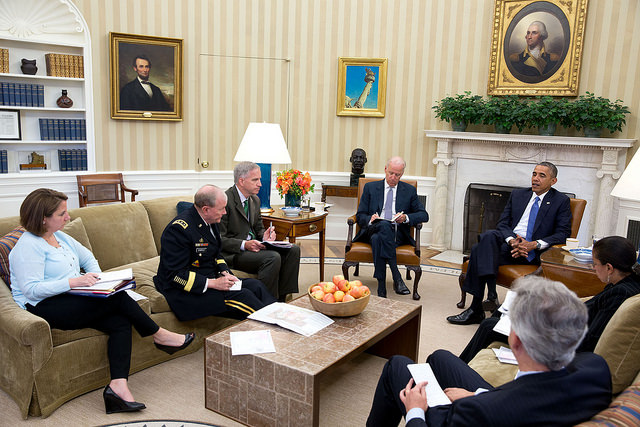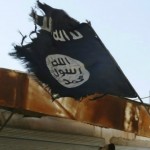by Henry Precht
A bunch of fanatic radicals is on the verge of inflicting grievous damage on the traditional states of the Middle East. Only sensible, but also radical changes in American policy can hope to arrest their advance. The first business is to understand what can’t be changed, what bits of history can’t be rewritten:
- The Islamic State of Iraq and Syria (ISIS) cannot be caused to disappear. Its seizure of Mosul and other Iraqi and Syria towns appears to be supported by their Sunni populations who bitterly resent their nation’s non-Sunni leaders. Their like has succeeded before in Vietnam and Afghanistan: Insurgents succeeding in an ocean of friendly fish.
- President Bashar al-Assad’s hands are deeply stained with the blood of his countrymen. He must go, albeit with a measure of grace permitted in his exit. Elements of his regime should be combined with secular oppositionists in new a governing setup.
- Prime Minister Nouri al-Maliki also must stand aside. He, like other rulers (Egypt’s Mohamed Morsi) who were excluded from political life, was too greedy and refused to share power with his competitors. Another Shia grandee willing to join with acceptable Sunni elders should replace him.
- The Kurdish occupation of Kirkuk should be ignored — especially if peshmerga troops are to be helpful against ISIS.
Next we turn to changes that are essential if the ISIS uprising is to be managed:
- Washington must realize that it has been backing the wrong side in the Syrian civil war. We mistakenly thought that some so-called moderate, free market democrats opposed to Assad could bring him down. They simply couldn’t compete and were outclassed by ISIS and like-minded Islamic extremists. Not so long before the strife began Washington quietly applauded Assad’s struggle against al-Qaeda. As distasteful a dictator as he is, he and we were brought together by a common enemy. Using an international front group with Russia, Iran and others, the US ought to let it be known that Damascus deserves help in the fight against ISIS before a replacement government can be set up.
- Taking an even bigger bite of crow meat, the US should acknowledge Iran’s importance in bottling up ISIS with units of its armed forces. To secure further cooperation, President Barack Obama and Co. should accept a reasonable nuclear deal with Hassan Rouhani rather than insisting on deal-destroying, but unnecessary, terms favored by Israel. Iranian cooperation will also be necessary if their friends Assad and Maliki are to be removed from office.
- Egypt might also be enlisted in the ISIS containment effort.
- Saudi Arabia, which has supported Sunni fanatics against Shia across the region, should be told that such behavior is inconsistent with a close defense relationship with the United States. The same message should be delivered to other Gulf regimes and intended as well for their ISIS-funding private citizens.
- Turkey and Jordan must be made to see that their borders with Syria need to be closed to the movement of fighters and their armaments. Otherwise they could be future ISIS targets.
- Iraq and Syria should be strongly encouraged to move to a genuine decentralized, federal system of government. Funds for humanitarian relief and reconstruction must be mobilized with cash coming from the Arabian Peninsula.
- Israel and its friends in Congress would be briefed on plans in general, but not allowed to impede them.
The alternative to diplomacy is a military operation. Such a US-led plan to defeat or, rather, contain ISIS would involve supplying arms to the Iraqi forces (which have proved to be in no shape to employ them) or mounting drone attacks and other surgical strikes — with the same probable results as seen on the Pakistan-Afghanistan border. If US planes or troops are used against ISIS, their retaliation against American targets can be expected together with Libya-like instability on the ground.
The guiding principle for America in this crisis ought to be to stay out and to remain as far back as possible, leaving the heavy lifting to those regional states — however previously repugnant — to do the needful. Their futures are at stake; they must take the lead in resisting ISIS.






I generally agree with the author’s points, but he softpedals our role in arming, training, funding the ISIS fighters through the CIA. Why on Earth do we take official statements about covert programs at face value? We know they can’t legally tell us anything. Though Obama has long said we would help these anti-Syrian forces by supplying intel, training, funding and humanitarian aid “and more,” we’ve been denying that we’ve been doing so. So, what else IS there? The Assad story has always been a grey one, but in the US it’s been presented absolutely black and white for a long time, that can only be a coordinated propaganda campaign–though the reporters may be unwittingly abetting CIA spokespersons. Those are “good” sources of information, and reporters seem willing to ignore contradictory stories to continue to affirm the CIA’s public stance. And, we know that cause even the CIA doesn’t have one voice. Intel is an issue of nuance, but when the nuance is lost, you’re not looking at intel but policy spun. Please, I take seriously any reporter, journalist or “expert” who insists on using public pronouncements where we know lots of covert action has made those pronouncements vacuous.
the last sentence should be, “I can NOT take seriously any journalist…”
This is another fine and thoughtful piece by Mr. Precht. Many people, including many Iranians, find dealing with the Iranian clerics very distasteful, and the same can be said about President Bashar Assad of Syria and Prime Minister Nuri al-Maliki of Iraq. Unfortunately, in politics often the choice is not between good and better, but between bad and worse. Therefore, in each of the three countries one has to look for the least bad option. The fact is that after over a decade of American wars in the Middle East, after spending trillions of dollars, thousands of Americans and hundreds of thousands of Syrians and Iraqis killed, what we are facing is a horrendous militant Sunni terrorism that poses a threat not only to those countries but to the entire region and to the West. If Al Qaeda is allowed to find a firm foothold in Iraq and Syria and control a large territory, something that it did not manage to do even in Afghanistan, the danger to the world would be inconceivable.
While agreeing with most of the points made in the article, I believe that we cannot put the cart before the horse. What is essential if all those sacrifices are not going to waste is first of all to put out the fire and then think about how to prevent the fire from breaking out again. There has just been an election in Syria, certainly flawed but not much more so than the elections in Ukraine and Egypt. The number one priority is to defeat the terrorists there and then introduce a federal system that would cater for the interests of different ethnic groups. The same should be done in Iraq, defeat the terrorists and establishing a Sunni, a Shia and a Kurdish region but without undermining Iraq’s territorial integrity.
Although Prime Minister al-Maliki must share some of the blame for what is going on in Iraq, the truth is that American forces were fighting the same militants in Fallujah and Mosul under a different name, led by Zarqawi instead of Baghdadi, long before al-Maliki had become prime minister. The fact of the matter is that the Iraqi Sunnis, encouraged and backed by Sunni dictatorships in the Persian Gulf region, have not accepted that a Shia government has come to power in Iraq and have for long been waging a campaign of terrorism, which killed more than 9,000 people in Iraq in 2013 alone. Now, they have come out of hiding and are openly challenging the Syrian and the Iraqi governments.
US and Iran have many shared interests in the Middle East, from preventing the return of the Taliban to power in Afghanistan to preventing the establishment of an Al Qaida state in Iraq and elsewhere. It is time for the United States and Iran to get over their differences and unite to forge a new order in the Middle East. The alliance between the US and Iran under the Shah was the only factor that kept the region stable for many decades, in the face of the rebellion in Dhofar, Saddam Hussein’s savage rule in Iraq, as well as communist plots to topple various governments. These are the only two countries that through an alliance with Turkey can again restore stability to the Middle East. The time has come to think outside the box and reshape the map of the Middle East. A closer partnership with the West would moderate Iranian foreign and domestic policies, and even help to resolve the Arab-Israeli conflict.
Mr Farhang’s last paragraph makes more sense toward a combined settlement of this latest issue. If the U.S. fails to reach a peaceful settlement with Iran, what’s left? Bomb! Bomb! Bomb! ? This is what happens when there are too many cooks in the kitchen. How about just having the U.S. pull out of the M.E. 100%. Let Israel go it alone, as they seem to have the answer[s] to eliminate everyone in opposition to their way of thinking. They can do it without any help what so ever from the U.S.